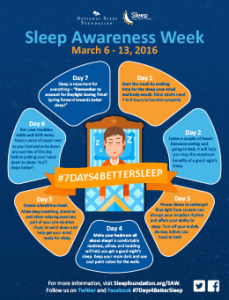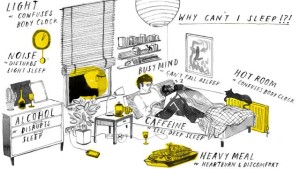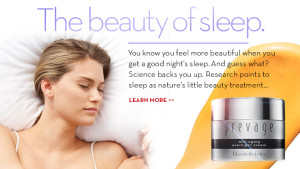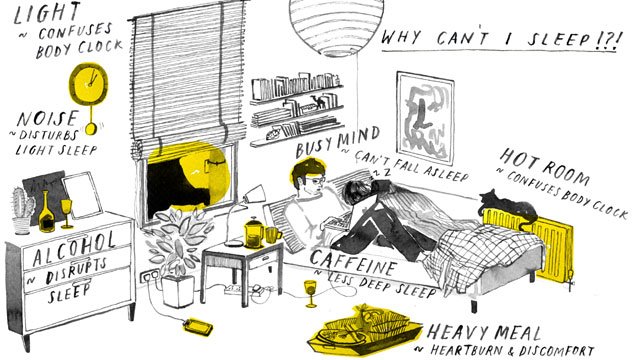 One in three people suffer from some form of insomnia in the U.S. With sleep a major contributor to health and wellness, we recognize it’s National Sleep Awareness Week.
One in three people suffer from some form of insomnia in the U.S. With sleep a major contributor to health and wellness, we recognize it’s National Sleep Awareness Week.
As a health economist, I’m well aware of sleep’s role in employee productivity, absenteeism and presenteeism. U.S. companies lose 11.3 days of lost work performance per person who suffers from insomnia, according to research from a Harvard-based team published in the journal Sleep. The cost of this to U.S. business is about $63 billion annually.
 Science writers at the BBC developed a long list of modern-life issues that deter us from sound sleeping. The major culprits are pervasive technology, lights, noise, heat, and stimulants (like alcohol and coffee), as illustrated in the BBC’s drawing of How We Live Now.
Science writers at the BBC developed a long list of modern-life issues that deter us from sound sleeping. The major culprits are pervasive technology, lights, noise, heat, and stimulants (like alcohol and coffee), as illustrated in the BBC’s drawing of How We Live Now.
Some key health issues you may not know about sleep are that…
Sleeplessness can contribute to the risk for diabetes and cardiovascular disease, according to the Centers for Disease Control.
Lack of sleep can activate the cannibinoid system, which can lead us to crave high-calorie foods (à la “the munchies”), based on research conducted by a team from the University of Chicago.
Poor sleep patterns can contribute to or be an indication for poor mental health, depression and anxiety, according to Dr. Lawrence Epstein at the Harvard Sleep Lab.
 On the up-side, good sleep is thought to be “nature’s beauty treatment.” The concept of “beauty sleep” isn’t a myth, as lack of sleep can trigger stressors that prevent the skin from combating pollutants and other environmental factors, says the Sleep Doctor, Dr. Michael Breus.
On the up-side, good sleep is thought to be “nature’s beauty treatment.” The concept of “beauty sleep” isn’t a myth, as lack of sleep can trigger stressors that prevent the skin from combating pollutants and other environmental factors, says the Sleep Doctor, Dr. Michael Breus.
Sleeplessness is a huge market opportunity; the global market is valued to reach over $80 billion by 2020. There’s a large current mass market for over-the-counter sleep aids and prescription drugs for sleep (which is slumping due to many Rx’s going off-patent or switching to OTC). Most recently, the heavily-DTC’d drug trying to wake up the Rx market for sleep therapy is Belsomra, featuring those pesky “awake” and “sleep” cats.
Beyond medications, there’s a growing business in technologies and consumer goods that promote sound sleep. The market for high-end, expensive mattresses has become competitive and crowded; an article in today’s Wall Street Journal notes that “Mattress Makers Unroll New Sales Approach,” such as free shipping and free returns (taking a page out of Zappos but for a much larger, more expensive consumer product to ship).
On the tech side, Big Data will play a growing role in assessing and supporting better sleep. IBM Watson Health and the American Sleep Apnea Association launched the SleepHealth app to connect the dots between poor sleep quality and personal health. This was announced as the first Apple ResearchKit study to run in IBM’s Watson Health cloud.
The SleepHealth study uses the open source ResearchKit framework designed by Apple to enable participants to easily complete tasks and submit surveys right from the SleepHealth app. SleepHealth is the first ResearchKit study to run on the data-rich Watson Health Cloud.
Health Populi’s Hot Points: At the Consumer Electronics Show in January 2016, I saw several sleep-oriented technologies which I wrote about here in the Huffington Post (combined with the pain category, directly related to sleep quality).
In a health-world with little future certainty, here’s one that this economist-trend-weaver can assure you: the market for sleep assistance will grow given the aging population, nagging stressors of daily life, and growing health provider concerns about sleep as a component of healthy living in a value-based payment environment.
Follow the hashtag #7DaysforBetterSleep to track Twitter’s conversation on the subject this week of National Sleep Awareness.





 Thank you FeedSpot for
Thank you FeedSpot for